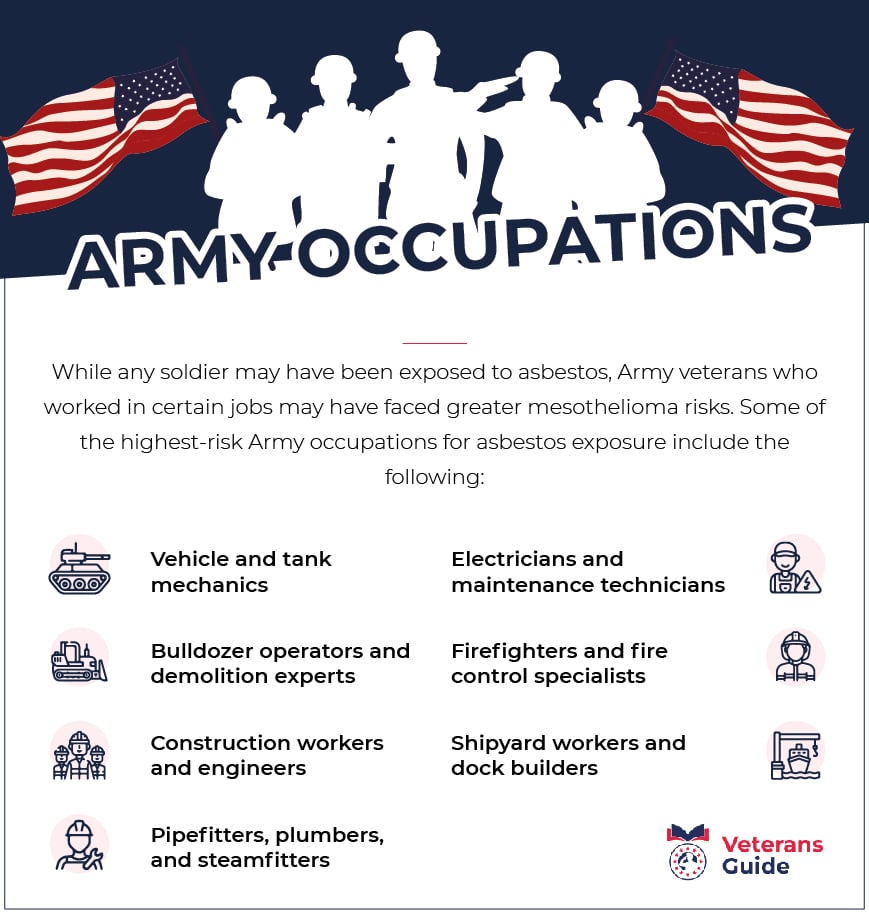Mesothelioma in the Army
Mesothelioma is a devastating cancer caused by asbestos exposure, which was commonly used in the U.S. Army for decades. Army veterans who develop mesothelioma even many years after their service may be eligible for VA benefits and other compensation. This article will explain the risk of mesothelioma in the Army, the benefits and legal options available, and how to get help if you or a loved one is an Army veteran affected by mesothelioma.
While asbestos is now known to cause serious diseases like mesothelioma, this wasn’t always the case. Like many other branches of the armed forces, the Army used asbestos-containing materials heavily for much of the 20th century. The widespread asbestos use has put many Army veterans at risk of developing mesothelioma, even if their exposure occurred decades ago. If you suspect your mesothelioma may have resulted from asbestos exposure during your Army service, you have options for accessing health care, benefits, and compensation.
Asbestos Exposure in the Army
Mesothelioma is an aggressive cancer that develops in the lining of the lungs, chest, abdomen, or heart due to inhaling or ingesting asbestos fibers. These fibers cause inflammation and scarring, which can lead to malignant tumors 20 to 50 years after exposure. Unfortunately, mesothelioma is often advanced and difficult to treat by the time of diagnosis.
The Army used asbestos in many buildings, vehicles, aircraft, and equipment. Asbestos was valued for its heat resistance, strength, and insulating properties.
The U.S. Army used asbestos extensively from the 1930s through the early 1980s.
Army Barracks and Installations
Numerous U.S. Army barracks, offices, and other structures were built during the 20th century with asbestos-containing materials. Asbestos has been found in insulation, flooring, roofing, drywall, cement, paint, caulking, gaskets, pipes, and more. As these materials aged and crumbled, asbestos fibers were released into the air, where they could be inhaled.
Some of the many Army installations known to have asbestos issues include the following:
- Fort Bragg in North Carolina
- Fort Knox and
- Fort Campbell in Kentucky
- Fort Hood in Texas
- Fort Jackson in South Carolina
- Fort Dix in New Jersey
- Fort Polk in Louisiana
- Fort Belvoir in Virginia
- Fort Lewis in Washington
- Fort McCoy in Wisconsin
- Camp Dodge in Iowa
Asbestos exposure at these bases and others placed many soldiers and civilian workers at risk. Veterans who lived in contaminated barracks or worked in asbestos-laden buildings may be more likely to develop mesothelioma.
Army Vehicles
In addition to buildings, the Army used asbestos in many vehicles, weapon systems, and other equipment. Asbestos was especially common in vehicle friction parts like brakes, clutches, and gaskets. Army mechanics who worked on jeeps, trucks, tanks, and aircraft likely experienced elevated rates of asbestos exposure, particularly when performing repairs that involved scraping, sanding, or blowing out asbestos dust.
Asbestos materials were also used in many Army plane and helicopter engines, turbines, electrical wiring, and heat shielding. Other concerning sources of asbestos in Army equipment included:
- Boilers, pipes, and insulated wiring
- Fireproof suits, gloves, and blankets
- Rifle and artillery mounts/padding
- Shipboard flooring, gaskets, and valves
- Soundproofing and protective coatings
Anytime these asbestos-containing parts or materials were damaged or disturbed, hazardous fibers could be released, posing health risks to Army personnel.
Exposed to Asbestos in the Military?


Army Occupations
While any soldier may have been exposed to asbestos, Army veterans who worked in certain jobs may have faced greater mesothelioma risks. Some of the highest-risk Army occupations for asbestos exposure include the following:
- Vehicle and tank mechanics
- Bulldozer operators and demolition experts
- Construction workers and engineers
- Pipefitters, plumbers, and steamfitters
- Electricians and maintenance technicians
- Firefighters and fire control specialists
- Shipyard workers and dock builders
These jobs often involved directly handling, installing, repairing, or demolishing asbestos-containing materials, increasing the chances of hazardous fiber inhalation. Even Army administrative staff could have been exposed to airborne asbestos fibers while working in contaminated office buildings.

Foreign Countries
Army soldiers who served overseas, particularly in active combat zones, may have experienced greater asbestos exposure risks. Many older buildings in regions like the Middle East contained asbestos products that could release fibers when damaged by combat or demolition. Some of the foreign countries where Army veterans may have increased exposure include Iraq, Afghanistan, Kuwait, Korea, and Vietnam.
Secondary Asbestos Exposure in the Army
Sadly, Army veterans aren’t the only ones at risk of developing mesothelioma from military asbestos exposure. Their family members could also face health dangers from secondhand asbestos brought home on a soldier’s uniform, gear, skin, or hair.
Spouses of Army veterans are at an especially high risk of secondary asbestos exposure and mesothelioma. Those who regularly laundered their partners’ asbestos-contaminated work clothes could inhale fibers shaken loose. Children could also be exposed by playing near or hugging a parent wearing contaminated work clothes.
Benefits for Army Veterans with Mesothelioma
Army veterans diagnosed with mesothelioma caused by military asbestos exposure are entitled to special benefits through the Department of Veterans Affairs.
VA Disability
The VA rates mesothelioma as 100 percent disabling, meaning veterans can receive maximum monthly compensation. The Code of Federal Regulations covers mesothelioma under diagnostic code 6819 as a “malignant neoplasm.” For 2024, the VA disability rate for mesothelioma starts at $3,737.85 per month for single veterans. Higher compensation is available if the veteran has a spouse, children, or dependent parents.
To receive disability benefits, veterans must demonstrate their mesothelioma diagnosis and provide evidence that their cancer resulted from asbestos exposure during Army service. Records showing the veteran’s military occupational specialty, work locations, and length of service can help prove the connection between Army asbestos exposure and later-developing mesothelioma. However, if you worked in certain specialties during your Army service, the VA will presume that your asbestos exposure occurred in the military.
In addition to monthly payments, a 100 percent disability rating provides other valuable benefits, including priority VA health care enrollment, travel allowances, educational and employment benefits, home and vehicle adaptation grants, and more.
VA Pension
Low-income Army veterans with mesothelioma may qualify for a VA pension in addition to or instead of disability compensation. The VA pension is a needs-based benefit that supplements a veteran’s income up to a level set by Congress. To be eligible, veterans must meet minimum service requirements, have limited assets, and be over 65 or permanently disabled.
Veterans cannot get VA pensions and disability compensation simultaneously. If you are diagnosed with service-connected mesothelioma, you would collect the higher disability payment at the 100 percent rating for the disease.
Aid and Attendance
Veterans with mesothelioma who need help with activities of daily living can receive an additional Aid and Attendance allowance. This monetary benefit helps cover the costs of home health aides, assisted living, or nursing home care.
Mesothelioma Compensation for Army Veterans
In addition to VA benefits, Army veterans with mesothelioma may be eligible for compensation through lawsuits or trust fund claims against the companies that supplied asbestos products to the military.
Army Mesothelioma Lawsuit
Veterans cannot sue the Army itself, but they can file lawsuits against the manufacturers of the asbestos-containing products they were exposed to during service. These lawsuits seek compensation for medical expenses, lost income, pain and suffering, and other damages. Families can file wrongful death lawsuits if a veteran passes away from mesothelioma.
Settlement Amounts
Most mesothelioma lawsuits result in out-of-court settlements. The average settlement is around $1 million, but some reach the multi-millions. The settlement amount will depend on various factors, including pain and suffering, the severity of the illness, the extent of exposure, and much more. An experienced mesothelioma attorney can advise veterans on their legal options.
Asbestos Trust Fund Claims
Many asbestos products manufacturers filed for bankruptcy protection amid the flood of lawsuits pending against them. Courts required these companies to establish trust funds to compensate future mesothelioma victims.
Qualified veterans can file claims with one or more trusts in addition to or instead of a lawsuit. Trust claims usually get processed faster than lawsuits but may result in smaller payouts.
Contact Veterans Guide and Hire a Mesothelioma Lawyer
If you or someone you love was exposed to asbestos while in the military, contact Veterans Guide for help. We can connect you with an experienced mesothelioma lawyer who can identify the parties responsible for the asbestos exposure in the Army, determine the benefits and compensation you are eligible for, assist you with your VA claim, and file mesothelioma lawsuits and asbestos trust fund claims for you.


